Thoughts from the frontlines of the war in Lebanon. What I know I’ve included, and what I don’t I’ll leave up to you. Internet has been tough to find but I’ll try to keep things updated as often as I can. For more background on the conflict, check out our ongoing coverage of the Middle East…
Wednesday, July 12, 2006 | 12:01PM
Twelve plus hours after we landed in Beirut, the only civilian airport in the country was bombed by the Israeli Air Force. Apparently Hezbollah commandos crossed the Green Line last night and kidnapped two young Israeli soldiers, just weeks after a soldier was held for ransom by Hamas guerillas in Gaza City. Israel retaliated swiftly by taking half of the Palestinian Authority hostage and pounding the capital with missiles. Here in Lebanon, people expect the IDF to follow a similar protocol: first blasting from above, then invading with armoured vehicles for the first time in over six years. Whispers have begun to circulate about a march all the way to Beirut.
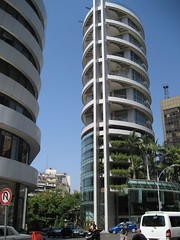 The whole episode raises obvious questions about connections to broader Islamic militancy, in a region already terrorized by conspiracy and unbounded nationalism. Despite its many conflicts with Shi’ism over the centuries, Syria’s Sunni leadership stands accused by the international community of funding Hezbollah’s occupation in the south, along with wealthy Shi’a extremists in nearby Iran. Even today, decades after their initial political and military intervention, the Syrians hold considerable sway in Lebanese domestic and international affairs, locked in a perpetual arm-wrestle with Israel over control of the Fertile Crescent. The country was also fingered in the assassination last summer of former Lebanese president/billionaire reconstructionist, Rafik Hariri, and is still perceived by students of the region’s tumultuous history as anything but neutral.
The whole episode raises obvious questions about connections to broader Islamic militancy, in a region already terrorized by conspiracy and unbounded nationalism. Despite its many conflicts with Shi’ism over the centuries, Syria’s Sunni leadership stands accused by the international community of funding Hezbollah’s occupation in the south, along with wealthy Shi’a extremists in nearby Iran. Even today, decades after their initial political and military intervention, the Syrians hold considerable sway in Lebanese domestic and international affairs, locked in a perpetual arm-wrestle with Israel over control of the Fertile Crescent. The country was also fingered in the assassination last summer of former Lebanese president/billionaire reconstructionist, Rafik Hariri, and is still perceived by students of the region’s tumultuous history as anything but neutral.
Perhaps it is this same Damascus connection (with their sponsors in Tehran) that has generated nothing but silence from international power brokers. Perhaps it is the threat of bilateral nuclear war. With the region set to convulse, armed conflict now seems inevitable. Extremists in Gaza and elsewhere are slowly wiping out centuries of misguided Western diplomacy and replacing it with Iraqi-style chaos and a new axis of Arab power, free of Judeo-Christian influence and foreign resource control. To be fair, a sustained regional peace has eluded local tribes since the rise of ancient Jericho over 11,000 years ago, but without any enlightened negotiation or creative political compromise — and a really long history lesson for leaders on both sides — hostilities aren’t likely to vanish any time soon, and the conflict between Hezbollah and Israel will likely escalate into a broader regional war.
Such a wonderful backdrop for my cousin’s wedding. Glad I brought my nicest suit.
Wednesday, July 12, 2006 | 6:30PM
An armada of Israeli tanks was headed north to secure the release of their prisoners, hidden somewhere in the southern valleys under Hezbollah control. My family in Marjayoon was trapped, unable travel north either to visit, escape the violence or attend their cousin’s wedding. On English tv, the journalistic bias is evident, as is their reliance on secondary sources like Reuters for “Breaking News”.
With friends and family translating, a better picture emerges: the threat is very real and the country is politically divided. Most civilians distrust Hezbollah’s control of the south and the foreign influence it implies, but with Israel targeting economic arteries throughout the country like commerial ports, electrical infrastructure and trade routes to Syria, civilians are already feeling the squeeze. Even more painful is the expected loss of billions of dollars in revenue from what was promising to be Lebanon’s Golden Summer for tourism, as the hospitality industry waits out the coming storm.
Neither side is winning friends with the locals at this point, and only time will tell which version of southern Lebanese autonomy rallies more civilian support: a foreign militia fighting on adopted home turf or the region’s military and economic hegemon with the backing of the Western world.
Thursday, July 13, 2006 | 12:25PM
In the downtown district of Achrafieh, the predominantly Christian Lebanese are taking the news in stride. Living with war and conflict for the better part of a century, and an occupation that lasted over two decades, residents have learned to only worry about violence when it happens. Threats no longer carry any weight. “When it is our time to go, we go” is a favourite Beiruti response.
Once home to the world’s first law school and still the epicentre of Arab democracy, Beirut’s streets aren’t quite so busy this week, and the military presence is obvious. In the Grand Serail, home to billions of dollars in reconstruction spending and the site of a 50,000-strong protest of the Danish cartoons, tourists are virtually non-existant, drying up a major source of revenue for the former French colony. Ferraris and Maybachs might have lined the streets of Manot in late June, but even the Saudis and the rest of their oil-rich cousins are keeping their distance today.
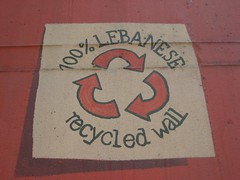 As we explore the empty streets, a favourite site of mine has become the bullet-riddled walls, some patched up with mortar and paint and others left to fester like gangrenous open sores. One building in Achrafieh promotes its foundation as “100% Recycled Lebanese Wall”, in homage to a quarter century of urban warfare and the will of the people to rebuild.
As we explore the empty streets, a favourite site of mine has become the bullet-riddled walls, some patched up with mortar and paint and others left to fester like gangrenous open sores. One building in Achrafieh promotes its foundation as “100% Recycled Lebanese Wall”, in homage to a quarter century of urban warfare and the will of the people to rebuild.
At the nearby ABC Mall, the city’s second-largest reconstruction project next to the ultra-chic downtown core, we are searched by a pair of uniformed Group4 Security agents with metal-detecting wands, under the careful supervision of a police officer in blue-grey fatigues.
This isn’t the Beirut I remember, but the locals have seen it all before.
Thursday, July 13, 2006 | 1:40PM
In the foyer of The Private Hotel, the staff are watching various iterations of Arab news. They’re convinced that we are only a few days from peace, but word of more bombings in the Bekka Valley — another Hezbollah stronghold and the site of an ongoing border dispute — are tempering any optimism.
Banks are still open, but equity markets trended downward in early trading; possibly in sympathy with their bigger, global peers, but more likely in response to the region’s growing political risk. Capitalism seems to be taking the conflict in stride, but it’s steps are increasingly cautious.
Thursday, July 13, 2006 | 2:47PM
Two days into the crisis and there has yet to be a single report either endorsing or condemning the actions on either side.
Approaching 3:00 on Thursday afternoon, BBC World finally reports that President Bush has implicated Syria in the conflict, surprising no one on either side of the contentious Blue Line. Reports are also starting to surface of a full Israeli blockade. Lebanon’s ports on land, sea and air have all been annexed by its southern neighbour, restricting both legal (i.e. economic) and illegal (i.e. Hezbollah) trade. The last air strike at Beirut airport took place in 1969 and the entire national fleet was destroyed. This time only the runways were targeted, on suspicion of Hezbollah’s alleged weapons smuggling. Fortunately for Middle East Airlines, Israel guaranteed its planes safe passage out of Lebanese airspace. No word yet on who was allowed to escape with them.
The locals may be comfortable with this sort of shadow diplomacy, but as tourists and wedding crashers we are all definitely on edge. Jumping at engine backfire and the like. This isn’t about two soldiers anymore: it’s about an armed militia in southern Lebanon, threatening Israeli existance. This is about broader Palestinian militancy and misplaced Arab nationalism. In response to any attacks on Beirut, Hezbollah is now threatening to attack Haifa. Consider today an escalation in every sense of the word.
Thursday, July 13, 2006 | 5:58PM
Picked up a cellphone just now. Feels really great to have our own line out. Feels even better to have a safe line in.
Thursday, July 13, 2006 | 8:30PM
We just got back from dinner, only to discover that Hezbollah has launched rockets deeper into Israel than ever before. In a cruel twist of fate, those same rockets hit one of the last stops on our Middle Eastern itinerary, and the home to some of my oldest and dearest family.
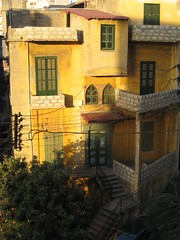 Therein lies the real danger of these attacks: a complete lack of precision. Israel’s strikes are a product of the very latest in American military technology — think Gulf War chimney-crashing accuracy. What they hit they mean to hit, for better or for worse. Hezbollah, on the other hand, is launching Soviet-era rockets designed more for collateral damage than strategic guerilla disarmament. David’s antiquated slingshot is nothing more than a reason for Israel to keep fighting, and fight on it has. Should the conflict continue along these terms, international law will certainly be broken (the exact term is “use of disproportionate force”) and higher courts will be convened. 1,000,000 displaced civilians have been ignored elsewhere before, but Lebanon’s cachet at the footsteps of Europe and the doorstep of Jerusalem has rallied UN support.
Therein lies the real danger of these attacks: a complete lack of precision. Israel’s strikes are a product of the very latest in American military technology — think Gulf War chimney-crashing accuracy. What they hit they mean to hit, for better or for worse. Hezbollah, on the other hand, is launching Soviet-era rockets designed more for collateral damage than strategic guerilla disarmament. David’s antiquated slingshot is nothing more than a reason for Israel to keep fighting, and fight on it has. Should the conflict continue along these terms, international law will certainly be broken (the exact term is “use of disproportionate force”) and higher courts will be convened. 1,000,000 displaced civilians have been ignored elsewhere before, but Lebanon’s cachet at the footsteps of Europe and the doorstep of Jerusalem has rallied UN support.
Israel just launched a fresh wave of attacks on the airport. Fuel supplies were hit and a towering inferno is now glowing in advance of the setting western sun. Other targets were also hit, including broadcast infrastructure near the Roman ruins of Baalbek – the largest such ruins in the world, and yet another planned destination on our trip. Not sure who suggested that all wars be settled by inter-Presedential arm wrestle, but I’m voting for him the next time he runs.
Friday, July 14, 2006 | 12:32AM
We just got back from our family’s place in Jdeide and it looks like all major bridges/roads out of Lebanon have been either destroyed or severely damaged. Still holding out hope for a route north through Turkey (considering their status as a favoured US ally) or southeast to Jordan by way of Syria (a very distant Plan B).
We relax with a subtitled English movie to pass the time. Coincidentally, I really dislike Ben Stiller comedies (or should I say comedy, as they’re all pretty much the same). Gross-out scene, militant pet scene, awkward relationship scene, generational issues scene, gross-out scene, etc. It’s not quite enough to tease our minds away from the reality outside.
Friday, July 14, 2006 | 4:05AM
It’s the morning of the wedding, and the bombs are raining down. At the time I was fast asleep, and it was Nat that first woke me up and asked if I could hear all the blasting. They were perceptably in the distance, but so frequent and resonant that it felt like a big bass drum, pounding away among the hills.
I’ve never heard an explosion first hand, but it sounds vaguely familiar. Like seeing a dead body for the first time after a lifetime of Hollywood gore. We’re in a relatively safe part of the city, protected, as it were, by the Maronite cross. Somehow, I still feel vulnerable.
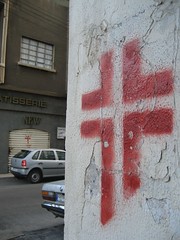 Downstairs in the hotel foyer, Freddie (our night concierge) is translating from one of the many channels broadcasting round the clock coverage of the conflict. He confirms that we’re in no direct harm, and wonders as the logic of it all. Hundreds of millions of dollars in damage for two captured Lebanese (one of whom was arrested as a 16 year old over two decades ago, and the other, whose mother was Israeli, was feeding information across the border to Hezbollah). He shrugs as his narrative is punctuated with another round of bombing, this one sounding much closer than the rest.
Downstairs in the hotel foyer, Freddie (our night concierge) is translating from one of the many channels broadcasting round the clock coverage of the conflict. He confirms that we’re in no direct harm, and wonders as the logic of it all. Hundreds of millions of dollars in damage for two captured Lebanese (one of whom was arrested as a 16 year old over two decades ago, and the other, whose mother was Israeli, was feeding information across the border to Hezbollah). He shrugs as his narrative is punctuated with another round of bombing, this one sounding much closer than the rest.
Most of the targets are Hezbollah infrastructure: tv stations, broadcast towers, munitions bases, etc. One Christian station was hit, presumably as a warning shot to the rest of Lebanon that disarming Hezbollah is everyone’s responsibility. Right now, as always, it certainly is.
Friday, July 14, 2006 | 5:12AM
A few lingering explosions. The sun is starting to rise and the morning paper just arrived by scooter. The last thing my mom remembers when she left Lebanon in 1964 was the sound of bombs falling. She was 14 at the time and teaching kindergarten. To calm the nerves of her frightened students, she would tell them the sounds were only thunder.
Last night at dinner, we all avoided talk of politics. It was a welcome change from the droning English news feeds. Our cable is out, but we still have power and I just can’t fall asleep. It’s weird. I don’t feel threatened directly, but the thought of someone else preventing me from leaving is enough to curdle my pacifist blood. Talk has now turned to our best route of escape. I suggest Turkey as a long-time US ally, but Freddy shook his head without much of an explanation. We’ll be tracking down the Canadian embassy later today to plan out our best course of action.
Poor Zeezo. All this bullshit on his wedding day.
Friday, July 14, 2006 | 5:50AM
We got through to the foreign service in Ottawa just now. The first question we were asked was if we had access to the internet. Even the guy’s name — “Christian” — seemed oddly fictional. His advice: don’t go anywhere. How’s that for Canadian intelligence? “We stand on guard for thee.” It’s times like this I wish I was an American. At least they can get us the fuck out! For all I know, our ambassador is paddling up the Mediterranean in an old birch canoe, with a six pack of Ex and some day-old peameal bacon.
Gotta get some sleep. Long day ahead…
Friday, July 14, 2006 | 11:33PM
Man, the Lebanese know how to party! The Metropolitan Palace Hotel provided the perfect rooftop venue for a wedding and Israeli F-16s provided all the fireworks. It’s amazing how festive this war has become, at least for those of us forced to enjoy it.
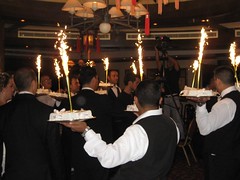 Outside, Hezbollah’s outspoken leader was targeted in this latest aerial attack, but it’s tough to catch anyone who travels in a 20-car envoy. Nusrallah’s militia continued to launch rockets into northern Israel today, and while the international community seems unified in their condemnation of the attacks, bureaucratic rhetoric is the only response they can muster.
Outside, Hezbollah’s outspoken leader was targeted in this latest aerial attack, but it’s tough to catch anyone who travels in a 20-car envoy. Nusrallah’s militia continued to launch rockets into northern Israel today, and while the international community seems unified in their condemnation of the attacks, bureaucratic rhetoric is the only response they can muster.
Domestic banks are still confident in their sizeable foreign reserves, but every day the conflict puts pressure on the Lebanese pound, and a bank run isn’t out of the question should the power get hit.
Among the scores of tourists all looking to escape, so far only the Cypriots and the Kuwaitis have been promised safe exit by their governments. The rest of us – Canadians, French, Swiss and Americans alike – have been put on administrative standby.
New weapons were also introduced into Hezbollah’s arsenal today, presumably of Iranian origin by way of their Syrian allies. An unmanned drone was directed at Israeli gunships patrolling Beirut’s vacant harbour, and both sides of the conflict look eager to “escalate”.
My sympathies, like most of the country, lie not with supporters of an independently armed South Lebanon. As civilian casualties and infrastructure losses continue to mount, the real victims of the conflict are angry and the country now sits on the brink of civil war. Everyone involved understands the severity of the standoff, but even the politically impotent UN Security Council has crafted its language to avoid any meaningful offence.
Disarming Hezbollah is certainly in the best interest of the region, but actually occupying the south with Lebanese forces and removing any independent militants is the equivalent of invading the state of Texas, destroying its army and replacing them with US Forces. The Islamic militants already have their own communications infrastructure, their own cabinet minister, their own special forces, their own funding and their own motives. They will not go down without a fight, and who better to do all the punching than the country’s regional nemesis, furnished with bleading-edge American technology.
First thing tomorrow we’ll be looking into our “escape”. The major roads out of the country have been bombed, but tributaries still appear to be open and a route to Amman, through Damascus, is probably our safest bet.
Armageddon is on tv right now. Think I’ll watch the Americans save the world once again…
Saturday, July 15, 2006 | 4:10PM
Over shawarma and fries in a popular downtown square, a series of fresh blasts punctuated an otherwise uneventful morning. A Danish film crew interviewed us briefly, having traveled into the country along our same route of exit. That itinerary would take us north through Tripoli and on to Damascus, but our family – known for their caution in the face of the country’s past conflicts – is still unconvinced that it’s safe enough to flee.
As I write this, the sound from another two blasts rumbles through the hotel room. More challenging than the noise is the silence that follows. The blasts feel closer than yesterday, though everyone in Achrafieh insists that the targets are miles to the south and west, between us and the burning airport.
There’s something hypnotizing about conflict and danger, but I’m tempering my boyish enthusiasm with sanity and caution. 150+ targets have been hit, from roads and gas stations to radio towers and power stations, and with no public sanction from the Lebanese government, Hezbollah doesn’t look deterred. Tiberias was just hit with Katyusha rockets, the furthest into Israel the rogue militia has shelled so far. Civilians along both sides of the border are now living in their bomb shelters, true mirrors of each other more today than ever before. We haven’t left the hotel room since lunch.
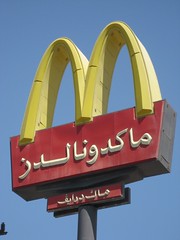 Another weapon surfaced today in Hezbollah’s growing arsenal, this one apparently of Iranian design. The rocket was aimed at an Israeli gunship along the country’s sun-drenched Mediterranean coast and raised fears of a gross underestimate of Shi’a firepower. Inflammatory Zionist rhetoric is now focused on bombing the country “back 20 years” if the militants don’t cooperate fully, but that strategy isn’t likely to return either of the captured soldiers or pacify the movement. Enlightened diplomacy now feels days and even weeks away, and the West is still on the fence.
Another weapon surfaced today in Hezbollah’s growing arsenal, this one apparently of Iranian design. The rocket was aimed at an Israeli gunship along the country’s sun-drenched Mediterranean coast and raised fears of a gross underestimate of Shi’a firepower. Inflammatory Zionist rhetoric is now focused on bombing the country “back 20 years” if the militants don’t cooperate fully, but that strategy isn’t likely to return either of the captured soldiers or pacify the movement. Enlightened diplomacy now feels days and even weeks away, and the West is still on the fence.
Israel is by far the relative military heavyweight, but with new and improved weaponry debuting every day, Soviet-style destruction is being replaced (or at least complimented) with a tactical, fourth generation response. The real concern is whether we’re reaching the end of Hezbollah’s military capacity, or if this fresh ballistic wave is only a sign of things to come. Right now, disarming the rebels is the Israeli Defence Force’s principal objective, one I would probably endorse if we didn’t have front row seats.
This conflict may see the end of Hezbollah, or the end of Lebanon, or the end of Israel’s regional hegemony, but which reality unfolds is still anyone’s guess. What Greater Palestine will hopefully avoid is another devestating “clash of civilizations”, as Syria and Iran reassert their influence in the region. Bilateral militarization is only good for gun runners, and the greater hope is that cooler heads prevail.
Quoting the reigning expert on the “clash”, from his captivating book on “The Middle East”, Bernard Lewis gives us the following cautionary prose: “‘The Great Satan’ is not an imperialist; he’s a tempter. He does not conquer, he seduces. The battle is still going between those who hate and fear the seductive and, in their view destructive, power of the Western way of life [i.e. Hezbollah], and those who see it as a new advance and a new opportunity in a continuing and fruitful interchange of cultures and civilizations [i.e. Lebanon and Israel].” That debate is unlikely to be settled over kidnapping and gunfire, but it’s one that must be pursued if lasting peace is even a remote objective of the war.
On a somewhat brighter note – as another bolt of thunder rips through the still afternoon air – my mom has just made new friends with a family across the street. Talking back and forth from their respective balconies on one of Beirut’s signature back streets, we’ve been invited to come by for tea and visit with her four, English-speaking kids. More on that when we get back…
Saturday, July 15, 2006 | 9:45PM
In the face of a rising international crisis, we just experienced Lebanese hospitality at its best. After chatting across balconies, we wandered across the street and enjoyed over four hours of coffee, local food, and great conversation with a beautiful family of six. They welcomed us into their home, and we talked about everything from politics to education to the aspirations of the new generation of Lebanese.
As always, the television was tuned into local coverage of the war. In this particular household, LBC was the broadcaster of choice, though we cycled through the other stations for different types of information. Hezbollah TV provided all the gore we could handle, with other major stations filling out the rest of the journalistic spectrum. As we all watched, natural questions arose about the local political spin. Displaced Shi’ite civilians were streaming north by foot, and South Beirut was now bursting at the seams with an influx of Hezbollah’s errant supporters. All this in the face of more rhetoric from the tongue-tied Arab League. Egypt’s President Mubarak and Jordan’s King Abdullah II both condemned the escalation as a threat to the stability of the region. “It is necessary to make a distinction” they insisted, “between legitimate resistance [to occupation] and irresponsible ‘adventurism’ adopted by certain elements within the state.” They were particularly displeased that the decision was made unilaterally, and are now calling the Middle Eastern peace process “dead”.
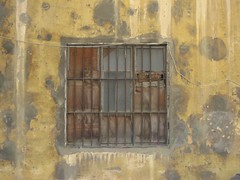 While we sat there talking, glancing at the news, drinking Lebanese coffee and snacking on decadent chocolate biscuits, Israel continued its systematic bombing of the country’s major ports. One of the louder blasts hit the popular beach community of Jounieh, where the mother of our new friends was living in fear of an errant missile.
While we sat there talking, glancing at the news, drinking Lebanese coffee and snacking on decadent chocolate biscuits, Israel continued its systematic bombing of the country’s major ports. One of the louder blasts hit the popular beach community of Jounieh, where the mother of our new friends was living in fear of an errant missile.
I asked why the government was powerless to intervene, and the answer was both depressing and worrisome. Simply put, Hezbollah is better funded and armed than the Lebanese themselves, and with the country crippled by corruption and blatant political self-interest, the terrorist militia thrived in the vacuum of legitimate power. Lebanon’s is a tragic fate: a (predominantly Christian) punching bag, caught between Syria (Islam) and Israel (Judaism) as the war over the kingdom of heaven continues to threaten peace here on earth.
In response to the recent shelling, the Lebanese PM – a successor and friend to Hariri – gave a live video address on all stations, in which he fumbled through a prepared speech with almost no direct eye contact. Comments from our new friends, when they even bother to listen, have more to do with his impotence than the content of his message.
I asked why they don’t leave Lebanon if the situation is getting worse, and their answer, voiced by their 17 year old daughter, was the best I’ve heard yet: “If I go, who will stay?” With hourly youth wages hovering around US$2 and unequal access to top-tier education, the country is trying to rebuild itself on a foundation of hope, lofty promises and international charity. But with every bomb that drops and every leader that dies, Lebanon’s best and brightest are streaming out of the country, as those in power harvest what’s left of the fragile Lebanese Dream.
Sunday, July 16, 2006 | 12:38AM
Let the serenade begin. Jets just ripped through the air above the city, streaking back and forth as if to punctuate the rumble of their bombs.
As the shockwaves tug at the glass on our balcony window, a theory begins to emerge…though I’ve been known to craft impossibly complex conspiracies when my mind is left to wander! This time, as always, the trigger is information. While civilians are tucked away in their apartments, hotels and bomb shelters, it’s my guess that Nusrallah’s army is transporting weapons and personnel under the shadow of night through what’s left of the country’s ports, roads and other strategic tributaries, while the Israelis monitor them cautiously through high-tech night vision. The real risk here isn’t what’s moving out of the country, though exporting weapons in advance of defeat could potentially cause some trouble down the road. In my mind, the real threat is what might be moving in, including any so-called “freedom fighters” and their affiliated terrorist infrastructure. If that’s truly the case, I say let the bombs fall.
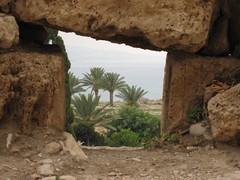 To be sure, no battleground is nearer to Israel than Lebanon, and no conflict is currently so unrestrained. Iran doesn’t make for a legitimate aggressor, given America’s military presence on both flanks. Syria is close enough, but would more likely supply weaponry and soldiers than its own vulnerable geography. Egypt relies on Israeli tourism more than it cares to admit, and is always eager to avoid displeasing its staunchest Western ally. Jordan, on the other hand, holds claim to the world’s most magnificent Queen, a majority of the world’s displaced Palestinians, and a dynasty of kings best served by the status quo.
To be sure, no battleground is nearer to Israel than Lebanon, and no conflict is currently so unrestrained. Iran doesn’t make for a legitimate aggressor, given America’s military presence on both flanks. Syria is close enough, but would more likely supply weaponry and soldiers than its own vulnerable geography. Egypt relies on Israeli tourism more than it cares to admit, and is always eager to avoid displeasing its staunchest Western ally. Jordan, on the other hand, holds claim to the world’s most magnificent Queen, a majority of the world’s displaced Palestinians, and a dynasty of kings best served by the status quo.
In short, if a war is going to be fought between Judaism and Islam, it will likely happen on Lebanese soil, and in the depths of my profoundly conspiratorial mind, these late-night blasts may be Israel’s best efforts to stop the early chaos from spreading.
Sunday, July 16, 2006 | 1:38AM
After the eighth crippling bomb in a row, I picked up the phone, called the Canadian Embassy in Lebanon, and was patched through to the 24 hour hotline at the Department of Foreign Affairs. As a proud Canadian citizen, I can honestly say that I’ve never been more embarrassed about my own nationality. It was like calling for computer tech support in the Gatineaus. First, I was told that “all operators were busy”. Then, I was kindly advised to hold, “as your call is important to us.” Two bomb blasts later, when I finally managed to get someone live on the line, I was asked the foreign policy equivalent of checking my power cord. I’m usually a really patient guy, but when I heard that I absolutely lost it.
To be fair, the woman on the other end of the line was in for a bona fide, Middle Eastern shit-storm. We’re sitting here in the hotel room as missiles continue to rain down, and she’s getting paid $15 an hour to tell me to “stay where we are”, like I was planning on running down to the port in a red and white thong with a Canadian flag draped around my shoulders.
She did confirm a few interesting pieces of information, like the fact that there are between 15,000 and 20,000 Canadians presently in Lebanon. She also confirmed that rockets were launched at a ship that was trying to evacuate foreigners to Saudi Arabia. Great save, I thought, but she could have offered that up without an interrogation. Better still, our government could have stepped up like the Americans, French, Swedes, Cypriots, Kuwaitis, etc. and at least informed their citizens that help is on the way.
When I suggested that she speak with someone about sending word to our fellow citizens still trapped in Lebanon, acknowledging that their country hasn’t completely abandoned them, her response was equally discomforting. As soon as they decide what they’re doing, she insisted, the government will let all registered citizens know exactly what to do.
When I suggested that they at least update their website more than once a year, if only to reassure us that we’re not on the bottom of some bureaucratic to-do list, she read from her call-centre crib notes yet again. I conceded that I didn’t know what was happening if Africa or the Far East right now, but I wondered if Lebanon was at least a moderate priority in the eyes of our government, given that thousands of its voting, tax-paying citizens were trapped in a war zone half a world away.
Her response was simple and spoke volumes about our country’s strength beyond it’s own borders: “We’ve called in three extra people this weekend to help deal with the situation.” That’s one part-time staffer for every 6,000+ Canadians caught in the crossfire.
O Canada, we stand in line for thee…
Sunday, July 16, 2006 | 10:00PM
Nusrallah was on tv tonight, looking far less confident than ever and using increasingly antagonistic prose. Through the benefit of our amazing new friends, we received a fairly comprehensive translation. Among the highlights, Hezbollah’s not-so-fearless leader was bragging that the “Zionist enemy is ignorant of what we have”, and that his militia receives in the order of $100 million in funding and weapons every year.
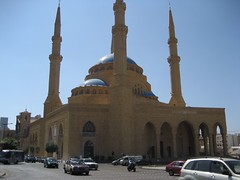 He also asked his “allies” in the Arab League for greater political and military cooperation. So far, not one has come forward to help or endorse his unilateral action, though Syria and Iran have both been implicit accomplices in Hezbollah’s activities for years.
He also asked his “allies” in the Arab League for greater political and military cooperation. So far, not one has come forward to help or endorse his unilateral action, though Syria and Iran have both been implicit accomplices in Hezbollah’s activities for years.
The type of unity Nusrallah is searching for has eluded the Arabs for centuries. Not since Saladin and the Third Crusade has the entire region been crystallized under a single political mandate, and even that one was inspired more by defense than Islamic imperialiasm. Beyond his status as a brilliant military tactician, Saladin was first and foremost a peacemaker of the highest degree, and his support throughout the Arab peninsula grew out of extreme political respect, not shared political rage.
Clauswitz once explained that “war was an extension of politics by other means,” but unike the Sultan’s defense of Greater Palestine in the late 12th century, this current conflict feels a lot more like war for the sake of war, or maybe fame for the sake of glory. In an age of globalization and multilateral diplomacy, kidnapping and civilian terror are unlikely to trigger any meaningful political sympathy, and Nusrallah’s fading influence may only encourage a desperate retaliation.
Monday, July 17, 2006 | 8:15PM
Just made one of the biggest decisions of my life.
It all started when we got back to the hotel and there was a message from my cousin Ziad. “Please call him,” the concierge had written in broken English. “He would like you to leave with him, because he found a way to go to Canada through Amman.”
Under the darkness of night, the plan involved paying a fleet of taxies $100 a head to leave at 4:00AM and take our family north through Tripoli to the Syrian border. Apparently a friend made the trip last night and arrived safely in Amman at 10:00AM the same day. It would involve 13 people in all, a fleet of late-model Mercedes Benz, a bus to carry our luggage, and another Syrian convoy to take us through Damascus and on into Jordan (by far the safest leg of the journey).
“Insane” was the first thought that came to mind. But when cooler heads prevailed, the plan wasn’t all that bad. As it stands, we’re registered for diplomatic “evacuation”, along with 16,000+ other Canadians and 25,000+ Americans, all from ports that no longer exist and on ships that can’t possibly handle all the traffic. From what we hear, women and children are slated to leave first, pushing our collective departure toward the back half of the exodus. Confounding the logistics even further is the bottleneck of airlifting civilians onto the ships, apparently in groups of 100-200 at a time.
Accurate information has been tough to come by, and everyone has their own version of the truth. Needless to say, the process will be nightmarish in its proportions and still susceptible to militant attack (Hezbollah successfully shot down an unmanned surveillance balloon over South Beirut earlier today) and we’ve yet to receive any correspondence from the mighty Canadian embassy.
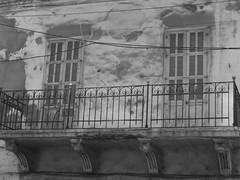 Such was my decision, and the information I had to make it (all within less than five minutes, I might add). On the one hand stood the promise of my country’s hapless Foreign Service; on the other, the well-intentioned advice of my Lebanese-Canadian family. Worse still, it directly impacted the lives of my mother and girlfriend, and my cousin needed an answer roughly ten minutes ago.
Such was my decision, and the information I had to make it (all within less than five minutes, I might add). On the one hand stood the promise of my country’s hapless Foreign Service; on the other, the well-intentioned advice of my Lebanese-Canadian family. Worse still, it directly impacted the lives of my mother and girlfriend, and my cousin needed an answer roughly ten minutes ago.
Consider “border crossing on the road to Damascus during a holy war” a great alternative for your next family vacation. I highly recommend it for all you adventuous types.
Oddy enough, the much harder decision was figuring out how to tell my Dad that we were now going to head out alone…
Monday, July 17, 2006 | 10:42PM
We just got word that Kid Canada is now en route with six commercial ships and a few leased planes to facilitate our evacuation. Apparently the Canadian government now realizes the value of good PR. Funny how the news first hit in eastern standard time, where angry voters are already shaking their fingers at MacKay’s delayed response. Then again, maybe it was the eight Canadians that died today that got the pundits involved.
On this end of the world, we first caught wind of the plans by phone, not from the embassy itself, or even its so-called “District Wardens”, but from friends and family watching closely back home. Meanwhile, the Americans and French have been all over the media, assuring their citizens that help is on the way. It’s nice to know that we’re all playing our part in Minister Pete’s publicity one-upmanship (the Americans, for instance, are only evacuating their citizens to Cyprus, but the Canucks are airlifting stranded nationals all the way home).
For our part, we’re sure that our safety is best left in the hands of those who have expressed a genuine interest in protecting it. Besides, we’ve already been to Cyprus and I can’t wait to check out the desert at Wadi Rum!
Tuesday, July 18, 2006 | 1:26AM
Six more explosions near the Port of Beirut, less than 5km away. What a wonderful soundtrack for packing. They came nearly an hour after F16s released a series of surveillance beacons high above the city (even managed to catch some on video). Troops are definitely on the move for both sides, and the more I think about it, the more I’m glad that we’re getting out pronto.
From what we hear, it’s only a matter of time before the Christian areas of the city come under fire, and waiting around for a sanctioned evacuation feels a lot more dangerous, particularly when the prospect of tourist kidnappings is now a realistic weapon in Hezbollah’s growing arsenal.
Two hours, fifteen minutes and counting…
Tuesday, July 18, 2006 | 5:08AM
The road to Damascus is deserted at this hour. We’re traveling in a convoy of five Mercedez Bens, with a van full of luggage taking up the rear. Our driver made the trip last night in less than 90 minutes. During the day, the same route would take over 8 hours, and the prospect of a ultra-quick getaway is helping to soften our nerves.
I’ve been watching the sky for any sign of surveillance, but right now all I can see are the stars. From what I’ve heard, they’re nothing like the views we’ll enjoy in the deserts of Jordan, but they’re still a very comforting sight. Venus is rising up ahead of the sun, and the lights of Beirut are fading in the distance. Two military checkpoints haven’t given us any hassle, and as dawn begins to break the traffic begins to swell.
Traveling in front are my cousin and his new Lebanese bride, along with the whole of their immediate family. Her’s is a particularly touching story: married four short days ago, she said goodbye to her family for what might be years as she heads off to Canada to start her new life. For those that remain, the tragedy is amplified by her loss, but tempered with hopes of a safe escape. It may be an auspicious beginning to a marriage, but one that should make a great story for their grandchildren to tell.
60 minutes until the border (we hope).
Tuesday, July 18, 2006 | 8:40AM
As we pull up to the Syrian border, a swarm of waiting taxies mistakes our convoy for the Lebanese mafia. On closer inspection, it’s no great surprise. The vehicle we’re taking into Damascus is at least 20 years old, and contrasts well with our late model Mercedes. It’s missing the entire centre console, all seatbelt restraints, shocks, working brakes and, perhaps most importantly in the rising desert heat, any form of climate control.
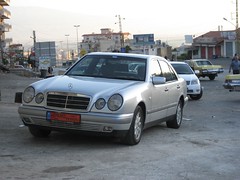
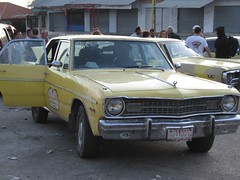
Queued up to cross into relative safety, we’re all still on edge. The driver asks us for US$10, only to slip it into the hands of the border guard as our car pulls through the first checkpoint. Soldiers are waiting on both sides of the road, with Russian automatic weaponry hanging a little too comfortably over their narrow shoulders.
Both sides of the crossing are post-apocalyptic, but from where we’re sitting in the back of a derelict Damascus cab, it feels more like Syrian chaos spilling into Lebanon than the other way around.
In a rare twist of globalization, the first building we see beyond the guard tower is a brand new “Dunkin’ Donuts”. The second is the “Ministry of Interior”. Inside the single-story building, you could almost skate along the dusty granite floors. Without going into too much detail, the bathrooms were unusable. Over 100,000 people have already crossed through the border, and at US$65 a head, hopefully the Ministry can afford an upgrade.
For a neighbouring country, Syrians are nothing at all like their Lebanese cousins. I see fewer smiles, more facial hair, and little patience for foreigners. Given the cold reception at customs, I feel like we’re in for a long ride to the capital.
On a more positive note, I haven’t heard an explosion in over 6 hours.
Tuesday, July 18, 2006 | 9:22AM
As we approached the Syrian capital, fatigue finally settled in. Damascus may have boasted a rich and storied past, but under its current communist stewards, it was probably best that we slept through the experience. Reading about Saladin’s consolidation during the Third Crusade, and following the exploits of the infamous turncoat T.E. Lawrence as he flirted with Arab nationalism, the city’s best years were now just painful memories in a country still trapped under the weight of an obsolete empire.
When I woke up, we were already on the outskirts of the ancient city. Scheduled to rendezvous outside an urban military base, the other two cars in the convoy were nowhere to be found. We waited under a busy bridge for almost half an hour. Eventually, our replacement driver turned up in a modest automotive upgrade (this one was only 15 years old), and as soon our fellow travelers arrived we were all eager to depart.
From downtown Damascus, the Jordanian border was less than two hours away, and for all of us making the long journey together, Abdullah’s peaceful kingdom couldn’t come soon enough.
Tuesday, July 18, 2006 | 10:15AM
You can tell a lot about a country by its borders, and Jordan makes a great first impression. Singing customs agents, friendly tourism officials, clean, air-conditioned facilities; maybe it’s grandeur was only skin deep, but after traveling through a country still skeptical of foreigners, this enlightened hospitality is a breath of fresh Arabian air.
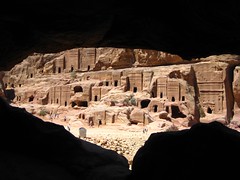 Home to displaced Palestinians for over 40 years, King Hussein’s magic kingdom seems like the model for modern Arab governance. Sharing open borders with Israel, Syria, Saudi Arabia and Iraq, the country has been caught in the middle of every major regional conflict since the Yom Kippur War, but it’s still regarded as one of the few region’s few success stories.
Home to displaced Palestinians for over 40 years, King Hussein’s magic kingdom seems like the model for modern Arab governance. Sharing open borders with Israel, Syria, Saudi Arabia and Iraq, the country has been caught in the middle of every major regional conflict since the Yom Kippur War, but it’s still regarded as one of the few region’s few success stories.
From the many Crusader castles that litter the King’s Highway to the ancient Greco-Roman ruins at Philadelphia (in modern day Amman) to the dazzling desert landscapes of Petra and Wadi Rum, there’s more than enough here to keep our bodies safe and our minds at ease.
Next stop: the country’s capital, and Rania, the jewel of all Arabia.
Tuesday, July 18, 2006 | 4:13PM
Finally safe in Amman, Jordan, by way of Damascus and Tripoli. It’s 37 degrees and 100% bomb free. We’re sitting with friends, sipping tea, smoking nargile (Arabic water pipe) and enjoying the cool desert breeze as our nerves continue to settle. Fireworks are exploding all over the city, and while the sound is strangely familiar, it’s good to feel at ease. Some of the blasts are in sympathy with the Palestinian cause, others to celebrate marriage, but I still find myself glancing skyward whenever the serenade begins. Amman offers an interesting contrast to the sights and sounds of our last few days in Beirut, now unreachably far away, and for the first time this trip is starting to feel like a real vacation.
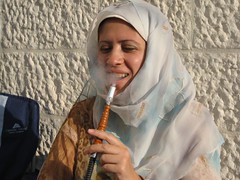 Nearly 70% of Jordan’s population are Palestinian refugees (from Lebanon, Israel, Iraq, Egypt and Kuwait) and the Muslim influence is obvious, though not overwhelming. Cafes and bakeries litter the streets, serving knafe jiban (an delicious mix of honey, pastry and melted cheese) and falafel (spicey, deep fried chickpeas) to crowds of hungry men. The city is full of tourists from around the Arabian peninsula, and license plates from Iraq, Saudi Arabia and the Emirates are commonplace. As the heat of the midday sun begins to fade, Amman is coming to life. It’s a refreshing change from the vacant, breathless prison of downtown Beirut, but our thoughts still linger on the many Lebanese who are either too poor, too stubborn or too patriotic to leave the war behind.
Nearly 70% of Jordan’s population are Palestinian refugees (from Lebanon, Israel, Iraq, Egypt and Kuwait) and the Muslim influence is obvious, though not overwhelming. Cafes and bakeries litter the streets, serving knafe jiban (an delicious mix of honey, pastry and melted cheese) and falafel (spicey, deep fried chickpeas) to crowds of hungry men. The city is full of tourists from around the Arabian peninsula, and license plates from Iraq, Saudi Arabia and the Emirates are commonplace. As the heat of the midday sun begins to fade, Amman is coming to life. It’s a refreshing change from the vacant, breathless prison of downtown Beirut, but our thoughts still linger on the many Lebanese who are either too poor, too stubborn or too patriotic to leave the war behind.
Wednesday, July 19, 2006 | 6:45PM
Our former bastion of Achrafieh was shelled today. It was the first time in over two decades that a Christian district has been targeted by Israel, and further proof that no area in the country is immune to the threat of growing violence. The missile hit a truck carrying a large industrial drill, which apparently looked like an anti-aircraft gun from unmanned aerial surveillance. No one was killed in the blast, but nerves were irreparably rattled, and pedestrian traffic has slowed to a trickle as the city braces for more.
Now hundreds of kilometers away, news of the attack was strangely surreal. Forty hours ago we made a run for the border, balking at the Canadian government’s efforts to shepherd its sizeable flock to safety. But for scores of immigrant workers and an isolated middle class, escape is not an option. Illegal workers from Ethiopia, Somalia, Sri Lanka, and Egypt are completely on their own, and at $1000+ a head, the cost to flee into Syria is more than most Lebanese families can bear. Theirs is a fate all too common in these parts, trapped between politics and religion without any legitimate voice. The only option now is to sit tight and pray that the country doesn’t slip into another civil war.
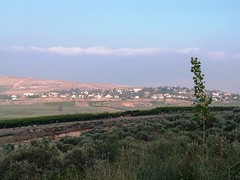 Perhaps even greater is the tragedy of life in the south, where support for Hezbollah has been strong but it certainly isn’t unanimous. Tens of thousands of civilians have suffered without food, water and power for days, and aid agencies are now warning of a true humanitarian catastrophe. Two years ago I spent nearly a week with my family near the Lebanese-Israeli border, and safety was the last thing on my mind. Driving through forests of olive trees, picking up fresh breakfast at the village baker, gazing over the hills at Syria and Israel, the former occupied territories are truly something to behold.
Perhaps even greater is the tragedy of life in the south, where support for Hezbollah has been strong but it certainly isn’t unanimous. Tens of thousands of civilians have suffered without food, water and power for days, and aid agencies are now warning of a true humanitarian catastrophe. Two years ago I spent nearly a week with my family near the Lebanese-Israeli border, and safety was the last thing on my mind. Driving through forests of olive trees, picking up fresh breakfast at the village baker, gazing over the hills at Syria and Israel, the former occupied territories are truly something to behold.
For centuries, Marjayoon was a trading post along the road to Beirut, where spices and textiles from Damascus, Jerusalem and Baghdad traded hands long before the West ever drew its lines in the sand. Agriculture and trade are still a regional specialty, and long afternoon talks over tea and nargeli are a great way to pass the endless free time. But over the last seven days, that quiet, peaceful dream has descended into an absolute nightmare. Thousands of villagers are fleeing north by foot every day, and with the threat of an all-out ground invasion looming on the horizon, a loss of that relaxed southern lifestyle may be the greatest casualty of all.
Thursday, July 20, 2006 | 10:55PM
Earlier today, Israel conducted its biggest airstrike yet. Over 2300 tonnes of explosives rained down on the beleaguered Lebanese countryside, and all eyes are now on the region as it slips toward another violent episode in a history scared by war.
On the ground, Hezbollah’s guerillas have successfully repelled two days of incursions across the Lebanese border, giving confidence to the guerrilla tribe after the devastating aerial campaign. Their Iranian-trained gunmen have waited for years to test themselves against a better-equipped Israeli Defense Force (IDF) and in the early stages of conventional battle they seem to be holding their own.
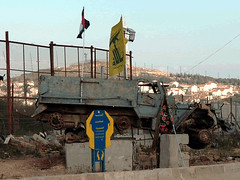 As the image of Western strength, influence and technology in the region, all anti-Western elements are now gunning for the Jewish state, and reinforcements are streaming into the south from the rest of allied “Paelstine”. Israel is in for a difficult fight as Goliath to an Arabic David, and even Lebanon is vowing to join forces with Hezbollah before it ever turns weapons on itself.
As the image of Western strength, influence and technology in the region, all anti-Western elements are now gunning for the Jewish state, and reinforcements are streaming into the south from the rest of allied “Paelstine”. Israel is in for a difficult fight as Goliath to an Arabic David, and even Lebanon is vowing to join forces with Hezbollah before it ever turns weapons on itself.
In Beirut, American Marines are now on the ground for the first time in over 20 years, evacuating citizens still trapped in the chaos of the mass civilian exodus. Further south, Israel is now advising residents to leave their homes immediately, choosing airdropped leaflets and targeted text messages as their propagandist media of choice.
Across the border, Jewish politicians still insist that the IDF has no intention to occupy the south, but will use any military measures to fully disarm the rogue militia. In the words of an Israeli general, the fighting “is meant to last a long time”.
At the United Nations in New York, Kofi Annan has called for an immediate halt of hostilities and a simultaneous deployment of UN peacekeepers. “Israel has a right to defend itself” he conceded, but “the disproportionate use of force…must stop”. Thanks for the update, Kofi. Glad you’re keeping on top of things.
The Americans were equally unimpressed by the Secretary General’s reactive message, saying they would wait to find out more about the UN’s plan before committing to any action. The response from Israel’s Ambassador was unwavering. “When you operate on a cancerous growth…you make sure it’s totally removed”. He also pointed fingers at the growing Shi’ite axis of Syria and Iran.
As the conflict rages on, 20,000 people a day have been streaming through the Syrian border and 10,000 cars a day have made it all the way south into Jordan. Muslim refugees have been given food and water from their saturated Arab neighbour, but ominously, early polls reveal that it is mostly women and children who are making the trip. Apparently the men are staying behind to fight, joining ranks with Hezbollah in record numbers to fight a country they’ve been programmed to hate.
Even here in Amman, Palestinian sympathy and solidarity is spilling out into the streets. Tomorrow afternoon there’s a planned demonstration in support of an allied Palestine. As more protests spring up in Damascus and Baghdad, other regional powers are being drawn into the fray. Muslims are congregating in support of the Lebanese cause, and we’ll try to find out more about the rally later this evening, along with a safe vantage point from which to observe the call to arms…
Tuesday, July 25, 2006 | 9:58AM
Below is an email from the Canadian government to all of its citizens still trapped in Lebanon. Not sure what qualifies as a Foreign Affairs “failure” these days, but from this side of the Mediterranean, the answer is painfully clear.
Dear Canadian Citizen,
The Canadian Embassy in Beirut is no longer contacting registered Canadians to board evacuation ships. All registered Canadians who have valid passports or valid proof of Canadian citizenship must present themselves at BIEL (Beirut International Exhibition and Leisure centre) at 9 a.m. on Tuesday, July 25, 2006. Those who do not have a valid Canadian passport or proof of citizenship must go to the Canadian Embassy in Beirut with proof of ID and 3 pictures in order to be issued an emergency passport. The Embassy is open from 9 a.m. to 5 p.m. for this service. If you do not get on a ship on Tuesday, you will get instructions at the port for the following day.
On Wednesday July 26, 2006, the Canadian government will be undertaking an evacuation of Canadians citizens in southern Lebanon. A ship that can carry up to 1000 passengers, has been chartered by the Canadian Government and Canadian citizens and their dependants (immediate family members: spouses, minor siblings, minor children) and parents of minor Canadian children, wishing to leave Lebanon should go directly to the Port of Tyre (Sür) on Wednesday morning (July 26) and should not/not wait for further communication from the Canadian Embassy in Beirut. The ship is expected to arrive in the Port of Tyre between 9am and 10am local time. We recommend that you be at the port at least one hour before the ship’s arrival. Please pass this information to any Canadian citizens you are aware of, to ensure all Canadians in the Tyre area are aware of this opportunity to leave. Please ensure that you have your Canadian passport (valid or expired) or proof of citizenship with you and any other travel document. Emergency passports will be issued at the port or on the boat to replace expired Canadian passports.
You will only be allowed one piece of carry-on luggage per person. Any additional luggage will have to be left behind. Pets will not be allowed. Please ensure that you have adequate amounts of any required medication (sufficient for a minimum 72 hrs).
Canadians and their dependants should gather their passports and other important documents. Canadians who possess expired Canadian travel documents will be issued emergency passports in Beirut only.
Only a limited number of people can be evacuated each day due to port congestion and security measures. We urge Canadians to go to the BIEL assembly point in Beirut. PLEASE DO NOT COME TO THE EMBASSY.
Canadians should register with the Embassy on-line at www.voyage.gc.ca. If you know a Canadian citizen who is not registered, please pass this message to him/her and ask him/her to register immediately.
The Canadian government has chartered vessels for this evacuation. The first ship departed Beirut for Cyprus on Wednesday July 19, 2006. Canadian officials have met and will continue to meet the evacuees in Cyprus and Turkey to facilitate their onward travel to Canada. 6 ships departed Beirut on Thursday July 20, 2006 and went to Turkey (Mersin). 3 ships left Beirut en route to Cyprus and Turkey on Friday July 21, 2006. 2 ships left for Cyprus on Saturday July 22, 2006. On July 23, 2006, 5 ships left Beirut, 2 to Cyprus and 3 to Turkey. Today (Monday July 24), the Canadian Government had 1 ship leaving from Beirut. 2 ships are scheduled to leave from Beirut on July 25, 2006. We continue to work around the clock to ensure that all those Canadians who wish to leave do so and won’t stop until this is achieved. We continue to use all vessels at our disposal.
Friday, July 28, 2006 | 10:44PM
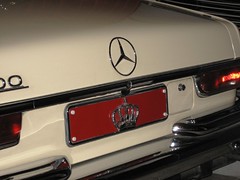 Taking a break from all the action, it was time to tour around King Abdullah’s playground and witness first-hand the other face of Palestine. East of the Jordan River, under the relative peace of another former British protectorate, you wouldn’t know the neighbours were at war. Car enthusiasts still stream through the Royal Automobile Museum, gawking at dozens of Hussein’s pimped-out rides. Nature enthusiasts still bbq along the rolling (but well-littered) valleys of Amman Park. Food enthusiasts still sample cuisine from all over Greater Arabia, often falling in love with the simplest shawarma. Sports enthusiasts still find a game of football wherever the astroturf or pounded dirst allows. Sadly, female enthusiasts are out of luck during the day, unless they’re willing to visit the malls.
Taking a break from all the action, it was time to tour around King Abdullah’s playground and witness first-hand the other face of Palestine. East of the Jordan River, under the relative peace of another former British protectorate, you wouldn’t know the neighbours were at war. Car enthusiasts still stream through the Royal Automobile Museum, gawking at dozens of Hussein’s pimped-out rides. Nature enthusiasts still bbq along the rolling (but well-littered) valleys of Amman Park. Food enthusiasts still sample cuisine from all over Greater Arabia, often falling in love with the simplest shawarma. Sports enthusiasts still find a game of football wherever the astroturf or pounded dirst allows. Sadly, female enthusiasts are out of luck during the day, unless they’re willing to visit the malls.
Past the short driveway and the platoon of armed guards, we discovered all the women in Jordan. Under a giant yellow façade — one that cost its owner two years in prison just to colour — it should’ve come as no surprise. Indoor malls are a favourite destination for shoppers and tourists around the globe, and Mecca Mall in downtown Amman is certainly no exception.
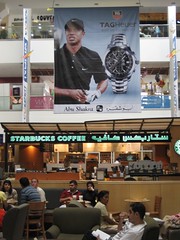 The sprawling retail complex is impressive, both in its size and architectural grandeur, and many consumer pilgrims flock to its air conditioned halls. Were it not for a few distinctly Arabian quirks, I could easily mistake it for Toronto’s Yorkdale or Vancouver’s Pan Pacific Mall.
The sprawling retail complex is impressive, both in its size and architectural grandeur, and many consumer pilgrims flock to its air conditioned halls. Were it not for a few distinctly Arabian quirks, I could easily mistake it for Toronto’s Yorkdale or Vancouver’s Pan Pacific Mall.
On the way in, we pass through a small security station, complete with two staggered metal detectors. The first is for men, the second for women. Posters of Che Guevara hang in the windows of the music store, as women in full burkas shop for designer lingerie. Cell phones ring with the latest 50 Cent tune, while shopkeepers light up right in front of their stores. Packs of young girls shop for make-up arm-in-arm, as pairs of young men head for lattes hand-in-hand.
At 4:24, the call to prayer is blasted over the intercom, but looking around, I’m the only one to notice. If Beirut is the most Arabic city in Europe, Amman must be the most European metropolis in the greater Arabian peninsula.
Nowhere is that Mediterranean flare more obvious than along the waterfront, as Aqaba blossoms within its new “Special Economic Zone” branding and the Dead Sea still draws thousands a year to its salty shores. As we floated along in the buoyant lake under the blistering summer sun, the hills of Jordan and Israel sprawling out like two sides of a giant sandstone bowl, the role of natural resources in the history of the broader regional conflict came into much shaper focus. Before Mohammad, before Christ, before Jerusalem and before Canaan, the biggest wars were still waged over land.
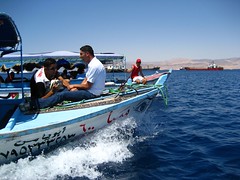 Many of those early battles took place in this same Garden of Eden, as the world’s only edible rock became a polarizing social resource for growing cities. As humankind’s earliest preservative, it allowed simple agrarian societies to coalesce around large stores of food, freeing up valuable human resources to pursue more collective social activities (like building roads and shared public spaces). Lives were lost over it, kingdoms rose and fell because of it, and as permanent cities planted their roots, salt quickly became one the most valuable resources of the Neolithic and early Copper Age.
Many of those early battles took place in this same Garden of Eden, as the world’s only edible rock became a polarizing social resource for growing cities. As humankind’s earliest preservative, it allowed simple agrarian societies to coalesce around large stores of food, freeing up valuable human resources to pursue more collective social activities (like building roads and shared public spaces). Lives were lost over it, kingdoms rose and fell because of it, and as permanent cities planted their roots, salt quickly became one the most valuable resources of the Neolithic and early Copper Age.
Today, with oil prices hovering at $80 a barrel and gold approaching $600 an ounce, little thought is ever given to the world’s first global commodity. But slathered with rejuvenating mud and baking away under the bright Trans-Jordanian sky, nature’s imposing presence in the region becomes difficult to ignore. Precious metals and lush green valleys have defined regional ideologies and civilizations since the dawn of recorded time, but sharing nature’s bounty with others has always remained an exception to the rule.
Saturday, July 29, 2006 | 10:53AM
Two days ago, Israel bulldozed across a very delicate political line. In yet another security cabinet meeting, Israeli Justice Minister Haim Ramon insisted that “everyone in southern Lebanon is a terrorist and is connected to Hizbollah.” I have yet to study the subtle nuances of the Geneva Convention, but this just strikes me as overtly belligerant, and borders on the insane. Few peace-loving civilians on either side of the border would argue that Hezbollah is a stabilizing, long-term solution to the existance of a Jewish state, but to paint the entire south in Hezbollah yellow and “destroy [it] by fire” will only fuel continued hatred and rebellion.
The more I think about the people actually living on either side of the electrified chain-link fence, the more I realize how big a role poverty and education play in the resolution of the process on the ground. In the highest reaches of the Knesset and the Lebanese Parliament, neither is a factor when war-time decisions are being made. The crisis of information is now clear. Most villagers never interact with their regional or national government, most news is provided in the village square, and most civilian infrastructre is provided by agencies like the UN…and in the case of southern Lebanon, Hezbollah.
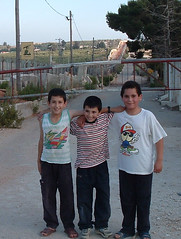 Much like the role Hamas has played in Gaza, Hezbollah was the only institution around to shepherd the people through the carnage of decades of civil war. They helped to rebuild houses and schools, they arranged for food to be distributed to those in need, and they rallied fierce anti-Israeli sentiment in the wake of a devestating occupation.
Much like the role Hamas has played in Gaza, Hezbollah was the only institution around to shepherd the people through the carnage of decades of civil war. They helped to rebuild houses and schools, they arranged for food to be distributed to those in need, and they rallied fierce anti-Israeli sentiment in the wake of a devestating occupation.
All of which raises some obvious questions about the easiest path to peace. If some other institution cared enough to step in during the 80s and provide basic social services to an area ravaged by war, would Hezbollah still be the force for southern Lebanese patriotism that it is today? Would an objective, supportive system of education side-step the hatred and propaganda that fuels the militia’s civilian support? Would regional economic integration, rather than regional isolation, provide workers and traders with a better understanding of their neighbours?
In the end, people only stop hating if they’re given a really good reason, and being “destroyed by fire” strikes me as a difficult way to start off the process. As long as pride and military conquest are the only objects of war, a lasting peace can never materialize. As long as leaders forget that it’s their people, not their ideas, that they ultimately represent, civilians will continue to die. Another war will spring up to replace this one as long as vengance is the only history that the villagers, the militias, and the politicians understand.
Monday, July 31, 2006 | 12:12PM
It wasn’t until we crossed the border into Israel that I caught my first glimpse of the Palestinian paradox. Sure, sleeping through aerial raids and escaping over the mountains were both products of the same political dynamic, but I never felt like the microscope was ever on me. To be fair, I didn’t shave this morning, had Syrian stamps on my passport and was traveling from one side of a war to the other, but nothing could have prepared me for what was in store as we first crossed the Allenby Bridge. The best way to describe the whole experience is three hours of traveler’s purgatory, with nothing but checkpoints, assault rifles and the occasional palm tree to break up the sprawling border complex.
As soon as we stepped off the shuttle and into the occupied West Bank, I could tell we were all being watched. An Israeli passport might have helped here, but as we marched on, I began to doubt it. Nobody, including us peace-making Canadians, were immune from this unique brand of universal suspicion. It’s time like this when I long for a diplomatic passport.
Cell phones chimed back and forth between the guards and the baggage handlers, who tossed our luggage into a huge security scanner and steered us toward another crowded checkpoint. Beyond the his-and-hers metal detectors, we entered a large waiting room which, considering the early hour, was relatively full. Visitors were herded like sheep from line to seat to line, filling out forms and answering personal questions as flies and smoke swirled all around.
My first mistake was asking for our passports not to be stamped with an Israeli entry visa. The reason was simple: I like to travel, and having an Israeli stamp on my passport would bar us from any further adventures in Lebanon and leave us personae non grata in most of northern Africa. The request came as a surprise to the first of many customs agents that morning. Thankfully, the young Indian woman behind the counter eventually came to understood our non-terrorist logic and was willing to ask her superiors for an exception. At that point, I had no idea how the next three hours would transpire, but as we quickly came to learn, societies that live in fear for their very existance don’t often make exceptions during war. Being Canadian didn’t help. Being charming didn’t help. Being with family didn’t help. The “system” identified us as anomalies, and into its bureaucratic clutches we were thrown.
“What is your job?” “Where do you live?” “Whose wedding did you attend?” “What are their names?” “Where are they from?” “What is their phone number?” “What languages do they speak?” “How long have they known each other?” “How long have you known each other?” “What is your job?” “Where do you live?” The questions came from the young, front-line custom’s staff, and our answers were scribbled down in Hebrew and carried through a small door that led, presumably, into the bowels of Israel’s border defense. Behind that door, I imagined a number of conspiratorial officers waiting to put even the squeakiest of alabies through the rigors of Israeli inquisition.
Between questions, we tried to pass the time by counting the number of different religious orders making their pilgrimage into the Holy Land. There were smiling Orthodox priests, flocks of Franciscan friars, a group of Indian gurus, and scores of Palistinian civilians. It was this final demographic, however, that attracted the most attention from border security. To their credit, the Arabs appeared to endure the stereotype in stride. For our part, we were three of only a handful of Western faces among the crowd, and at times, it felt like we were the centre of attention. To be fair, those suspicious glances only existed because we exist, as unknown quanta wandering through the ether of war. But when a system to sort out travelers from terrorists demeens an entire migrant population, cripples freedom and antagonizes cultural identity, the system must surely be flawed. If safety is the object, why can’t that object have a more human face? Even a proctologist puts on his glove with a smile.
At long last, a second, heavier set girl finally emerged from the back office with our passports in hand. “Sorry. Please follow me”. We walked over to another customs booth and watched as she scanned our travel documents again.
“I’m going to stamp your passports, yes?”
“Uh…is there any chance you could not stamp them?”
“Why don’t you want the stamp?”
“We read in a travel book that it was better not to get them stamped. You know…so we can still travel around the Middle Eas…”
STAMP!
“It is not a shame to be in Israel.”
“But I never said it was…”
“Weren’t you afraid to be in Lebanon?”
“Honestly, no more than here.”
It’s tough to describe the expression on her face when I compared the imperial State of Israel with their impotent neighbour to the north. If she hadn’t spoken so smugly, I might have held my tongue. But after three hours of waiting in vain, this unapologetic officer simply rubbed me the wrong way. I half expected this sort of ignorance on both sides of the border — particularly during a fierce guerilla war. But standing here on an empty stomach, swatting away the flies and dreaming as much about Old Jerusalem as leaving it behind, I can’t help but feel like Israelis should know better. Antagonism is hardly a prelude to lasting peace, and any occupying force that’s concerned with its own safety should take a page or ten from from pre-Christian Rome.
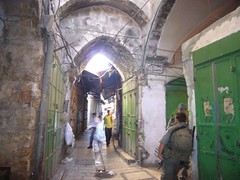 Tom Segev, a writer for the Israeli newspaper Haaretz, wrote a recent article in Foreign Affairs that makes the point even more clear. For the longest time, “the [Zionist] movement had adopted a basic strategy known as “maximum land, minimum Arabs,” and most of its thinkers had favored maintaining a solid Jewish majority in Jewish-controlled land over ruling vast areas populated by Arabs.” When that strategy was ultimately abandoned after the sweeping military success of the Six Day War, the Arab-Israeli conflict entered a new chapter of elevated social tension. An occupied West Bank raised important questions of security and governance, but at the time, the Knesset was undeterred. For the next three decades, Palestinians were forced to live under lock and key, within a sliver of land that runs west of the River Jordan and east of Jerusalem. They’ve become prisoners of both the occupying Israeli forces and, perhaps more savagly, their own militant rebels. Nowhere is that more clear than here at the border of Islamic soverignty.
Tom Segev, a writer for the Israeli newspaper Haaretz, wrote a recent article in Foreign Affairs that makes the point even more clear. For the longest time, “the [Zionist] movement had adopted a basic strategy known as “maximum land, minimum Arabs,” and most of its thinkers had favored maintaining a solid Jewish majority in Jewish-controlled land over ruling vast areas populated by Arabs.” When that strategy was ultimately abandoned after the sweeping military success of the Six Day War, the Arab-Israeli conflict entered a new chapter of elevated social tension. An occupied West Bank raised important questions of security and governance, but at the time, the Knesset was undeterred. For the next three decades, Palestinians were forced to live under lock and key, within a sliver of land that runs west of the River Jordan and east of Jerusalem. They’ve become prisoners of both the occupying Israeli forces and, perhaps more savagly, their own militant rebels. Nowhere is that more clear than here at the border of Islamic soverignty.
“The real answer,” insists Segev, “probably lies in the paradox inherent in the Zionist dream itself, which, in order to be realized, must be partly abandoned. Zionism holds that all of the biblical Promised Land belongs to the Jewish people. But Zionism is also a democratic vision…and to maintain a viable state that is both Jewish and democratic, they must give up territory populated largely by Arabs; incorporating these areas into Israel would make Israel less Jewish, less democratic, or both.” Such is the political concensus in Israel today, but it might have come a generation too late. My only hope, having crossed into the region at the heart of this great debate, is that humanity conquors ideology before the last soldier falls.
Monday, July 31, 2006 | 5:40PM
Black and white and all shades of desert, the West Bank is a region of contrasts, its new Israeli highway seperating one Arab shanty town from the next. Jewish settelments tower over swaths of arid desert, protected on all sides by miles of chain link fence. It’s tough to tell how much of the destruction has occured within the last 50 years, and how much of it still remains from previous 10 millenia of open warfare. To the uninitiated, one thing is obvious: the Garden of Eden is dead.
The region may be home to some of best agrigulture on the planet, but considering the number of people who have died to win control over this geographic purgatory — trapped between cliffs of standstone and the Mediterranean Sea — it hardly seems worth the effort. War and God are the only two pillars of life I can see, reinforced with fear and revenge, and barring any meaningful shift in the region’s fractured ideology — or the coming of Christ / the 12th Imam / [insert figure of monotheistic saviour here] — that fundamental charcter is unlikely to change.
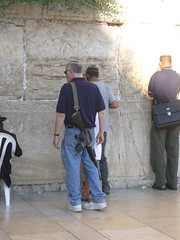 Our driver, Osama (“I have a dangrous name” he told us with a smile) pointed out the various fences and tunnels meant to sheppherd occupied Palestinians between zones of restricted access in East Jerusalem. I imagine there are a great many people inside those fences who resent having to live in a cage. I imagine those fences may even inspire the type of behaviour security forces try trying to prevent. In fairness to Israeli security, the streets were reasonably safe; they were also conspiciously empty.
Our driver, Osama (“I have a dangrous name” he told us with a smile) pointed out the various fences and tunnels meant to sheppherd occupied Palestinians between zones of restricted access in East Jerusalem. I imagine there are a great many people inside those fences who resent having to live in a cage. I imagine those fences may even inspire the type of behaviour security forces try trying to prevent. In fairness to Israeli security, the streets were reasonably safe; they were also conspiciously empty.
We started our tour of the city on the historic Mount of Olives, the place where God is expected to redeem the dead at the end of all days, and where Jesus wept over the squalor and impiety of the ancient Judean capital. Today, the Jewish cemetary has been immaculately restored, after its destruction at the hands of Jordan, and the views of the Old City are breathtaking. This is certainly the cleanest capital in the the region (at least that we’ve seen) and it’s clear that a great deal of money has been spent on reconstruction.
As we approached the Temple Mount in the early afternoon, the roads and shops were empty and closed. One of the few pedestrians left explained it all with a single word: “Qana”. Just yesterday, an Israeli missle crushed an apartment complex in the Southern Lebanese town of Qana, killing 56 people, almost three dozen of whom were children. Whether these “civilians” were complicit in Hezbollah’s armed resitance or unfortunate casualties of an asymmetrical war, the people of Old Jerusalem were taking a stand. The mood was intense, but somehow patient. I imagined how little the city had changed over the last 3,000 years, while the rest of the world sped by. I imagined Jews, Romans, Crusaders and Arabs, all marching through the streets in turn, their armour still damp with the blood of conquest. This city has seen it all.
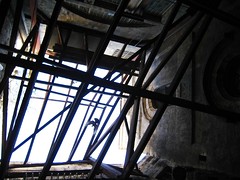 At one point, I saw a web of wooden scaffold overhead, barely holding a pair of buildings from collapse. A small horse paraded past one of the few open shops, his young jockey void of any facial expression. Inside, we found some of the most delicious Middle Eastern bread I’ve ever tasted. As I started to film the shopkeep, a few young men called and pointed. “Al Jazeera! Al Jazeera!” This is the Jerusalem I wanted to see. No tourists, no guns, no barbed-wire fences. This was a “Heritage of Peace“.
At one point, I saw a web of wooden scaffold overhead, barely holding a pair of buildings from collapse. A small horse paraded past one of the few open shops, his young jockey void of any facial expression. Inside, we found some of the most delicious Middle Eastern bread I’ve ever tasted. As I started to film the shopkeep, a few young men called and pointed. “Al Jazeera! Al Jazeera!” This is the Jerusalem I wanted to see. No tourists, no guns, no barbed-wire fences. This was a “Heritage of Peace“.
The Via Dolorosa was less impressive than I expected, but it was oddly seductive to trace Jesus’s final footsteps before the crucifiction. It was one of those rare occasions when history actually swallows you whole. The Church of the Holy Sepulchre was even more interesting, but more for its architectural scale. With a network of sprawling chapels and cathedrals representing seven distinct Christian faiths, the entire complex was a shrine to death and pennance. An Orthodox priest led us into the Franciscan cathedral and allowed us to touch part of the rock that was used to seal Jesus’s tomb. The Franciscans weren’t too happy about that and chased us out of the candle-lit shrine. The prist then led us toward the “centre of Christianity”, also conveniently ruled under the authority of the Byzentine church. The reason was simple but void of any theological merit: their cathedral stood between where Jesus was buried and where he was crucified. It was the Ottawa of our early Canadian commonwealth — caught between two sites of far greater importance and doted on by those who call it home.
The last stop on our one-day tour of monotheism was the infamous Western Wall. Other than the obvious spectacle of seeing a gigantic, 2,500 year old stone facade, I just didn’t get it. 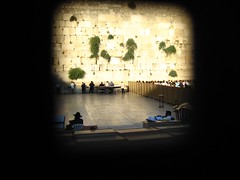 The Temple wasn’t the only piece of Jewish architecture destroyed by foreign invasion, but somehow it has become the most revered. 1967 brought Israel a lot of new real estate, including parts of East Jerusalem they hadn’t seen in nearly 500 years. Under the cloack of the Ottoman Empire, and later the British protectorate, the wall had remained under strict Muslim control, and early euphoria at its recapture was completely understandable. But almost 40 years later, the Third Temple is still unbuilt, and the twin mosques of Islam still loom over the prayers below. The tension was obvious, and more than a few suspicious eyes were cast my way. I saw a father at the Wall with his child, dressed in plain clothes and carrying an M-16 around his back. It feels like the great religions of the world are still grandstanding after all these years. My mosque is higher, my guns are bigger, my God is better. Everyone’s still looking to win.
The Temple wasn’t the only piece of Jewish architecture destroyed by foreign invasion, but somehow it has become the most revered. 1967 brought Israel a lot of new real estate, including parts of East Jerusalem they hadn’t seen in nearly 500 years. Under the cloack of the Ottoman Empire, and later the British protectorate, the wall had remained under strict Muslim control, and early euphoria at its recapture was completely understandable. But almost 40 years later, the Third Temple is still unbuilt, and the twin mosques of Islam still loom over the prayers below. The tension was obvious, and more than a few suspicious eyes were cast my way. I saw a father at the Wall with his child, dressed in plain clothes and carrying an M-16 around his back. It feels like the great religions of the world are still grandstanding after all these years. My mosque is higher, my guns are bigger, my God is better. Everyone’s still looking to win.
For our part, we’re just want some falafel, a good night’s sleep, and tomorrow, a safe flight home.